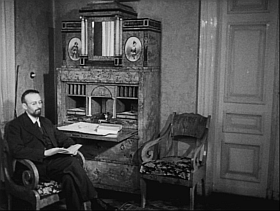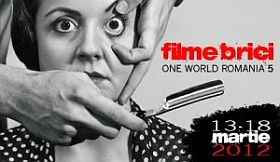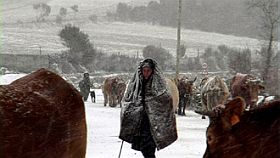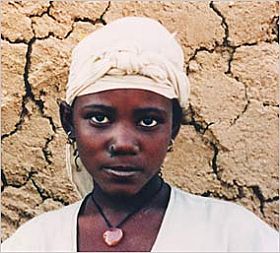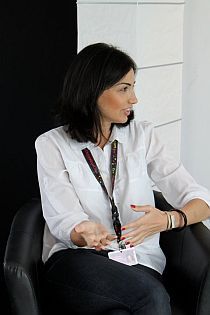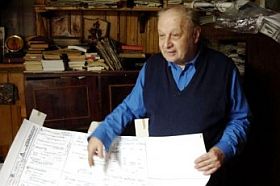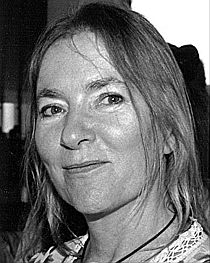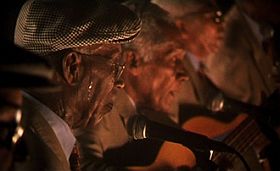…jeg kan roligt sætte mig ned og fordybe mig i noget af det klogeste, der er lavet på dansk film. Tilsyneladende blot fire kunstnerportrætter. Men nej, de fire film lukker sig op som én sammenhængende tanke om livets omfang og tankens grænse så smukt rollebesat med: Inger Christensen, Palle Nielsen, Pelle Gudmundsen – Holmgreen og Henning Larsen som medvirkende i undersøgelsen af det særlige ved digtet, billedet, musikken og arkitekturen og det almindelige ved kunstnerisk arbejde.
INGER CHRISTENSEN – CIKADERNE FINDES
Jeg glædede mig dengang sådan til at se den film. Det er så sjældent, jeg glæder mig til at se en film. Efterhånden.
Og jeg blev da også helt opslugt af dens én eneste bevægelse af skønhed og klogskab fra først til sidst – dette er film som musik, i den lille time for mig i hvert fald større end musik, selv om den største, Bachs musik, lå nedenunder. Et menneskeliv fra først til sidst, med døden nærværende siden barndommen. “Den sorg mit liv har overhalet..” siger den rolige, omhyggelige digterstemme. Den unge kvinde bliver ældre, men forbliver det smukkeste sted den samme. I stemmen, og i det stemmen siger, og på den måde, den siger det.
Venligt fortæller den om mødet med og fascinationen af den ældre og mere erfarne digter. “Jeg kendte nogle få, Rilke og Eliot især (hvilke omhyggeligt valgte få kendte denne unge kvinde ikke..), men han havde rejst og kendte mange, svenskerne især. Han havde boet et år i Stockholm på et legat…” Det er formuleringerne, som griber mig ved en særlig finhed, også om for eksempel det blot, at leve i Roms varme, “i de sydlige lande”, hvor der “ingen påfaldende overgang er mellem krop og verden…” Sådan er bogen Det blevet til, forklarer stemmen. Klogskaben synker i mig som forelskelse, mens Jakob Bonfils ustandselige kamera, Grete Møldrups enkle klippebords-fortælling og Jytte Rex’ generøse valg former Inger Christensens liv og digtning til en arabesk. “Piller lidt rust af min kind…”
Den største oplevelse jeg har haft i Cinemateket i København var for en del år siden, en dag hvor Inger Christensen ved et litterært arrangement i Bio Carl siddende ved et lille bord med et glas hvidvin under en klar spot læste Sommerfugledalen for os deltagere oppe i mørket. Ingen film var i det rum større. En af de smukkeste film, jeg kendte, var ellers netop Jytte Rex’ Inger Christensen – cikaderne findes fra. Den har jeg så tilbage, nu digteren er død.
Producenten, Christian Braad Thomsen skrev engang om den: “… Inger Christensen – cikaderne findes er i princippet én lang monolog af digteren i form af erindringer, refleksioner, værkkommentarer og digtoplæsning. Den indledes med den typiske Rex-signatur, en kameratur op ad trappen, her på behørig afstand af filmens hovedperson, der låser sig ind i sin lejlighed på Østerbro. Inger Christensen filmes i skiftende kameraindstillinger i sit digterværksted, som lige nu rummer flere bøger, end hun egentlig bryder sig om, nemlig Poul Borums. I deres ægteskab var hans bøger, hvad hun kærligt-ironisk kalder et “skændsmål”, og de flyttede ud med ham, men nu er de efter hans død vendt tilbage som i et skæbnens kredsløb – dog kun på midlertidigt ophold.
Hvad jeg især hæfter mig ved i portrættet af Inger Christensen er, så konkret, ja, næsten håndfast Danmarks store, visionære lyriker forholder sig til sin yderverden. Det begyndte i barndommen, hvor “verdens ende” var et præcist geografisk sted på den anden side af skoven eller lige uden for bygrænsen – og det fortsætter i digterlivet, hvor en faglig bog om springvand eller sommerfugle kan åbne den poetiske åre, og hvor en computer er et utænkeligt arbejdsredskab: papiret skal ligge håndgribeligt der på arbejdsbordet og vidne om digtets fysiske eksistens, som om hun frygter, at det ellers vil forsvinde som i drøm, sådan som det er jordens skæbne engang at forsvinde. Jytte Rex har fundet et 30 år gammelt filmklip frem, hvor Inger Christensen fremmaner denne apokalypse… :
Jorden drejer rundt / Og engang forsvinder den / Som sand der forsvinder mellem fingrene / Uden at der er nogen fingre / Den forsvinder bare Og sandet forsvinder / Og billedet af jorden som sand der forsvinder forsvinder.”
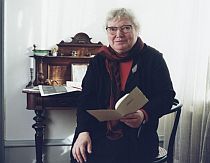
PALLE NIELSEN – MIG SKAL INTET FATTES
Palle Nielsen døde 2000. Året efter færdiggjorde Jytte Rex en af de bedste danske kunstnerfilm nogensinde, med ham og om hans arbejder, metoder og indsigter. I 2008 færdiggjorde Rex en bog, hun havde skrevet om Nielsen. Her finder jeg et citat, som i kort form indeholder meget af det hele, ja, så det må være stærkt inspirerende også for filmfolk. Palle Nielsen siger:
”Der er ikke den operation i mit arbejde, som jeg ikke har svært ved, alt falder mig tungt. Kun ved den største anstrengelse er det af og til muligt at stable et billede på benene. Det eneste, der er gratis og tilsyneladende kommer af sig selv, er det billede, jeg ser for mig allerførst, og som jeg arbejder med og prøver at give form.
Det der narrer nogle, er nok det glatpolerede færdige ved mine billeder – min rent håndværksmæssige glæde ved at gøre en ting færdig. Den kunstneriske vilje til at afslutte og fuldende ødelægger tit billeder lidt. Anspændelsen af alle kræfter, den store anstrengelse, synes jeg, er noget lykkeligt. At prøve at gøre mere, end man egentlig kan, frivilligt presse sig selv til det yderste, føler jeg som den største frihed.”
Lige netop sådan er stemningen i filmen med ham. Så ydmygt selvbevidst leverer han sine bidrag til den store undersøgelse af kunstnerisk arbejde.
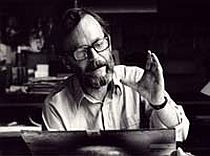
PELLE GUDMUNDSEN-HOLMGREEN – MUSIKKEN ER ET MONSTER
Komponisten står ude i havet i vand til brystet og forelæser om musikken til Perlefiskerne, og det er hverken krukket eller noget, for han taler alle vegne, uafbrudt, og nogle af stederne er ret originale. Og netop på det sted i filmen finder jeg det helt i orden, at han nu, så kropslig og flot og alvorlig og kyndig han har vist sig at være, at han nu står nøgen i havet og tydeligt nyder det, som han nyder at fortælle om musikkens væsen.
Og det er netop, hvad Jytte Rex har lavet, en film om musikkens væsen, som dette væsen bor i denne mand, som er hendes medvirkende. Som Palle Nielsen som hendes medvirkende i filmen om billedets væsen havde det i sig, som Inger Christensen i hendes film om tekstens væsen havde det i sig sådan har komponisten musikkens dæmon at omgås. Det taler han om et andet sted i filmen. Det er en vidunderlig film om kunstens overtagelse af sit menneske.
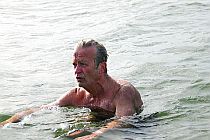
HENNING LARSEN – LYSET OG RUMMET
Jytte Rex binder fuldstændig sin nyeste film sammen med de tre forrige. I greb efter greb. Også Henning Larsen skal op ad en trappe. Tæppebelagt i et hvidmalet trapperum. Op til sin bolig, hvor alt er hvidt, især gulvene, forklarer han nøgtern, i en tilbedelse af lyset, dagslyset, som former rummene, som jo er hans kunsts genstand. Og han siger senere, at et rum kan være tydeligere i tåge, og i Riyadh skulle lyset begrænses. Som det er med musikkens lyd, er det med lyset, det skal formes, derfor er arkitektur som frossen musik, hedder det frapperende. På det mest neddæmpede fører Larsen mig stolt, beslutsomt og bestemt gennem filmens univers af æstetiske problemstillinger, inden for arkitekturen, ja vist, men med reference efter reference til kunstnerisk arbejde i det hele taget. Henning Larsen er spiller i Jytte Rex essayistik, hans bygningsværker er locations og landskaber til Jakob Bonfils’ og Steen Møller Rasmussens optagelser og Grete Møldrups klip placerer ham og hans replikkers fortælling nænsomt og sikkert i en uuventet sammenhæng. Uventet for dem, der ikke kender de tre film, som går forud for denne. Filmen med ham bliver med faste og beslutsomme hænder placeret som et stort og herefter uundværligt element, en fuldstændig bygningsfløj i en filmisk arkitektur. Filmen kan ses for sig selv, men den kan kun læses som et afsnit, det fjerde, men ikke sikkert det sidste i et stort, dybt integreret og dynamisk filmværk i fortsat udvikling, fra nu en firefløjet tavle med de forunderligste og skønneste billeder.
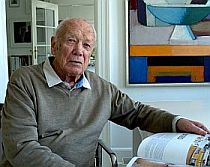
Jytte Rex: Inger Christensen – cikaderne findes, 1998, Palle Nielsen – mig skal intet fattes, 2001, Pelle Gudmundsen-Holmgreen – musikken er et monster, 2007 og Henning Larsen – lyset og rummet, 2012. Manuskript: Jytte Rex, fotografi: Jakob Bonfils, Steen Møller Rasmussen, Jane Vorre og Jytte Rex, lyd: Niels Arild, Jens Bangskjær, Jan Juhler og Morten Holm, klip: Grete Møldrup, produktion: Christian Braad Thomsen , Kollektiv Film, distribution: Kollektiv Film. To af filmene kan ses på filmstriben.dk og de kan alle lånes på biblioteket.



